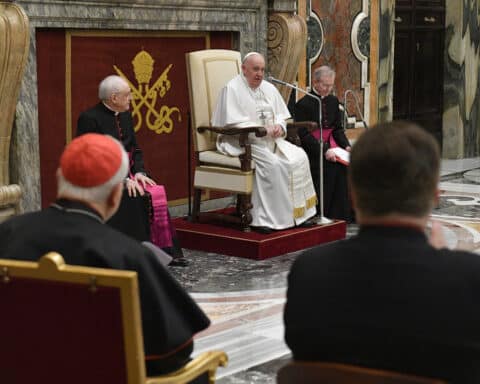Starting this Lent, priests in the United States can begin using the new translation of the formula of absolution. Even without a new translation in play, sometimes priests make mistakes when giving absolution. What should you do, as a penitent, if the priest gets the words wrong? As is so often the case: it depends. We need to distinguish between when a sacrament is celebrated licitly and when it is celebrated validly.
Licit vs. valid
According to canon law, the celebration of a sacrament is licit if all of the necessary laws of the Church are followed, including the words and actions specified for the liturgical rite (Canon 2 and 846.1). The rite for confession allows for relatively free adaptation according to the circumstances in which the confession takes place.
The validity of a sacrament, on the other hand, expresses whether or not the sacrament itself actually takes place. A valid celebration of the sacrament of penance forgives the penitent’s sins; if the celebration is invalid, the penitent retains his or her sins. There are four elements required for a valid confession: contrition, confession, satisfaction and absolution.
The penitent’s work vs. the priest’s
The first three of these are the penitent’s work. As penitents, we must have contrition, or sorrow for our sins combined with a firm purpose never to sin again (Canon 987). We must also make a complete confession, which is one that names at least all post-baptismal mortal sins that have not yet been absolved in individual confession (Canon 988.1). Finally, we must have the intention of making satisfaction for our sins by intending to complete whatever penance the priest assigns (Canon 981).
The fourth element required for validity is absolution by the priest. A validly ordained priest, with the faculty to absolve the penitent before him, must say and intend at least the minimal formula, “I absolve you from your sins, in the name of the Father, and of the Son, and of the Holy Spirit.” This formula encapsulates the essential effect of this sacrament: we are freed (“absolve you”) from our sins by God (“in the name …”) acting through a minister (“I”).
What should the penitent do?
So, what should you do if you think your confession was celebrated invalidly or illicitly?
First, it’s possible for the confession to be invalid because of some fault of the penitent. For example, if a penitent hides a particular mortal sin, the entire confession is invalid — no matter which words the priest uses for absolution. In this situation, the penitent must go to confession again, explain why his or her last confession was invalid, and confess again at least all the mortal sins since his or her last valid confession.
Second, the priest might say or omit something that would render the sacrament invalid. Remember that the standard here is the minimal formula of absolution, not the full prayer, and that there is room for different words even within that minimal formula, so long as the sense of it remains the same. For example, if the priest says “all your sins” rather than just “your sins,” the absolution is still valid. However, “I forgive you” in place of “I absolve you” would be invalid. If you are certain that the priest used an invalid formula, you need to speak up and ask Father to say the essential words as specified by the Church. This is for the priest’s good as well as for the penitent’s — we priests really do want you to leave with your sins forgiven! If you realize only after leaving the confessional that the absolution was invalid, then you should go to confession again, explain the situation to the priest, and confess again at least all your mortal sins since your last valid confession. (You may come across different theological opinions about the absolute minimum required for validity: for example, St. Thomas Aquinas thought that “I absolve you” was enough [Summa Theologiae, Part III, Question 84, Article 3]. However, we as penitents have a right to hear a formula of absolution that leaves no room for doubt.)
Finally, what if the priest uses a formula of absolution that isn’t invalid, but also isn’t what the Church gives us for a licit celebration of the sacrament? The most important thing here is to remain at peace: Your sins are forgiven! You could consider asking the priest to review the liturgical rite so that he can be more faithful to it in the future (Canon 978.2). However, as with any time we correct one of our brothers in Christ, we must be sure to speak truly out of charity for the priest, which includes stopping to consider whether he is in an emotional and mental state to receive the correction in love.
Most importantly, please be patient with us priests as we adapt to this new translation, and please pray for us — we need your prayers even when we’re celebrating the sacraments both validly and licitly!
Father Anthony VanBerkum, OP, is parochial vicar at St. Pius V Catholic Church in Providence, Rhode Island.





